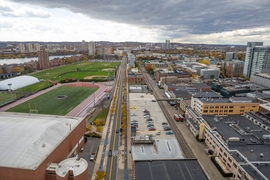Chancellor Cynthia Barnhart announced today that the West Garage parking facility (W45) is the preferred site for a proposed new undergraduate residence hall MIT is committed to bringing online. The building, which will require permitting and approvals from the City of Cambridge, is tentatively slated to be ready for students by fall 2020.
“This decision has the potential to place more students closer to the heart of our campus, which we know is very important to them,” says Barnhart. “It also presents us with two key revitalization opportunities: to enhance the quality of our housing stock for all students and to further unlock the potential of the Vassar corridor of West Campus.”
The site selection was welcomed by senior Kate Farris, DormCon president and a member of the New Residences Working Group, which was convened by the Division of Student Life and Office of Campus Planning in November to help develop conceptual design options for the dormitory.
“I'm very excited about this upcoming addition to Vassar Street, and I think it'll be a great addition to dormitory life. I look forward to working with the MIT community to help design an exceptional new dorm for the site,” says Farris.
“I know that the New Residences Working Group has been deeply engaged in envisioning a new residence hall in the abstract,” says Barnhart. “I hope this announcement adds a new spark to the creativity and thoughtfulness they’ve already demonstrated, and generates excitement among all MIT community members about the future of residential education and student life here.”
The New Residences Working Group’s efforts have been guided in large part by the Architectural Principles Document (APD), which was completed by another team of students, faculty, and staff in October. That group synthesized information from various sources and collected community feedback to develop a roadmap for the design, construction, and programming of new and renovated undergraduate residence halls. The APD’s key recommendations include designing dorms around a “cluster” of about 30 students and one Graduate Resident Tutor (GRT) in a mix of single rooms, double rooms, and shared community space. Additionally, the APD states that “critical paths” — or the path each resident must take to get to their room — should be considered when creating community-building spaces such as artist studios, fitness areas, lounges, and multipurpose rooms.
“Identifying a preferred location for the proposed new building brings us one step closer to the ideals for student life and learning that we have articulated,” says Vice President and Dean for Student Life Suzy Nelson, who led the development of the APD. “I look forward to engaging more voices in this important conversation about the future of West Campus.”
In addition to enhancing students’ academic and residential life experience, new housing will provide MIT the capacity and flexibility necessary to continue to address renovation needs in other dormitories. Comprehensive housing renewal planning, along with open space improvements and parking replacement options, are key elements of the West Campus Study, which the Office of Campus Planning is currently spearheading.
“We are now studying options for accommodating replacement parking as part of the West Campus planning process, and look forward to sharing plans as they evolve,” says Anthony Sharon, MIT deputy executive vice president, who oversees the Department of Facilities, which includes the Parking and Transportation Office. “I feel confident that we will be able to meet the needs of the MIT community for parking in this area."
Undergraduate and graduate housing renewal activity also extends to other areas of West Campus as well as to Kendall Square. In November, MIT announced that New House will undergo a phased renovation beginning this summer. Like the New Residences Working Group, New House students and MIT staff are actively engaged in a similar process for conceptualizing renovations to New House (W70).
On the east side of campus, a new graduate residence hall will be constructed as part of the Kendall Square Initiative, before the aging Eastgate graduate housing facility is removed. The new dormitory will replace all of the 201 units in Eastgate and add accommodations for another 250 graduate students. Other campus sites are also being examined as potential locations for additional graduate student housing.









